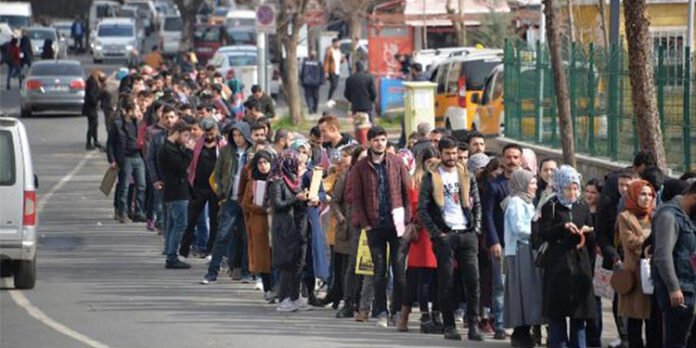More than half of Turkey’s young people are not working, a new study shows, revealing widespread hopelessness and low life satisfaction among a generation struggling with unemployment and poverty amid the country’s prolonged economic crisis, Turkish Minute reported.
The NEET Youth in Turkey: Preliminary Findings Report, compiled by İstanbul Bilgi University and released Thursday, surveyed 2,403 households across 29 provinces to examine the conditions of young people aged 18 to 29 who are Not in Education, Employment or Training (NEET). The study found that 46 percent of respondents are employed, while 54 percent are not working, a figure that also includes those still studying.
According to the report, roughly one-third of young people who are not working are also neither studying nor in any form of vocational training, placing Turkey among the countries with the highest NEET rates in the OECD and Europe.
Researchers Professor Emre Erdoğan, Professor Pınar Uyan-Semerci and Associate Professor Başak Ekim Akkan said economic hardship has eroded young people’s material welfare and weakened their psychological resilience and outlook for the future.
Women’s likelihood of being outside the workforce is 2.5 times higher than men’s, with nearly one-third of women citing family or caregiving responsibilities as the main reason for not working.
About one in three respondents expressed doubts about the usefulness of education, with 32 percent saying it does not prepare them for life and 36 percent saying it does not help them find a good job.
Economic conditions remain harsh. Among employed youth, 7 percent earn 9,000 lira ($215) or less per month, while 30 percent earn between 18,000 and 27,000 lira ($430–$645) and 25 percent between 27,000 and 36,000 lira ($645–$860). Most work in low-skilled, precarious jobs, highlighting what researchers call a gap between “quantitative employment growth” and “quality employment.”
The study, supported by the Scientific and Technological Research Council of Turkey (TÜBİTAK) under its COST Working Group Support Program, included 96 in-depth interviews and two focus groups with a total of 108 participants between April and July 2024 in İstanbul, Adana and Mersin, as well as a national survey conducted between May 10 and June 2, 2025.
Many respondents described being trapped in a cycle of inexperience and unemployment. Employers demand two to three years of experience, they said, but without being hired first, they cannot gain it. “I’ve been working for years, but insurance was never provided,” said a 33-year-old woman interviewed in Adana. “We complained; they were fined, but the fine wasn’t enough to deter them.”
Crises such as the pandemic, recent earthquakes and ongoing inflation have worsened the situation, disrupting education and pushing many out of the labor market. Factory jobs were described as physically demanding with low pay, while service-sector work offered little stability or advancement.
Family support remains a critical safety net, but dependence creates tension. “After a while, asking my father for money became difficult. It’s really hard, whether you’re 18 or 25,” one participant said. The report noted that financial strain and lack of autonomy have contributed to declining well-being and growing pessimism.
The desire to emigrate is widespread. About 67 percent of respondents said they want to move abroad for better job opportunities, while 36 percent said they “cannot see their future in Turkey.” Nearly nine in 10 agreed with the statement that “some people live better lives with less effort,” reflecting deep feelings of social injustice.
The study concluded with policy recommendations, urging reforms to strengthen scholarships and social assistance, expand affordable childcare to support women’s employment, improve job quality and provide psychosocial support services for young people. The research team also held policy workshops in Çukurova in June and online in October with representatives from government, nongovernmental organizations and academia to discuss solutions.










